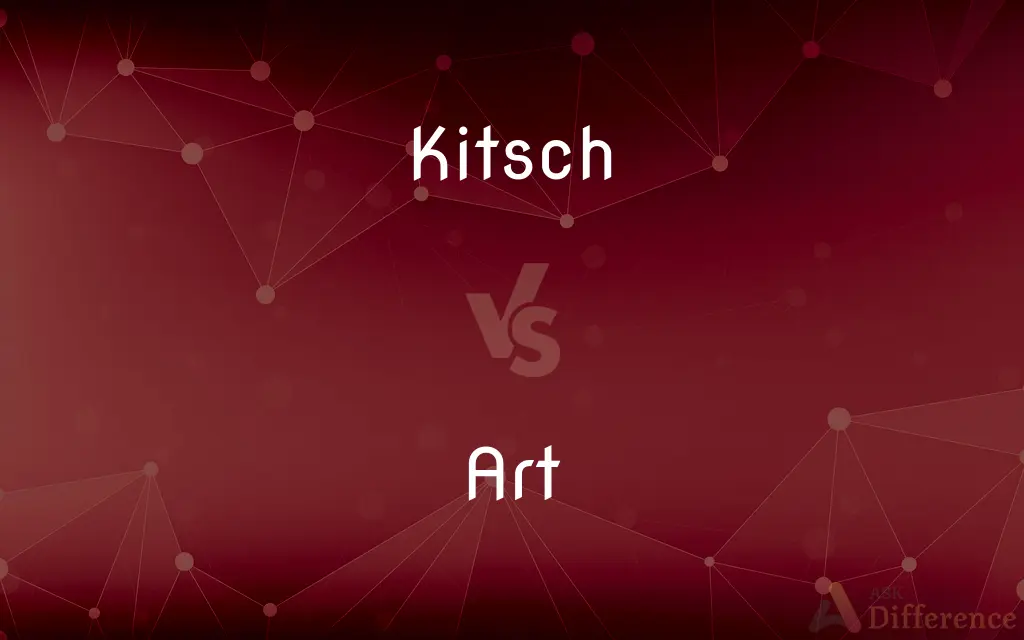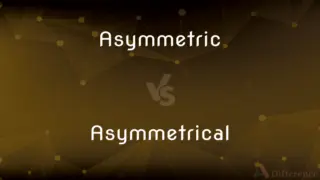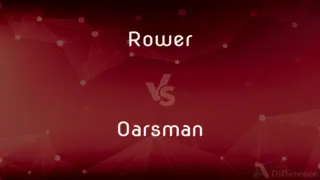Kitsch vs. Art — What's the Difference?
By Fiza Rafique & Maham Liaqat — Updated on May 6, 2024
Kitsch refers to art considered to be in poor taste because of excessive garishness or sentimentality, whereas art encompasses a broad range of human activities that involve creative or imaginative talent.

Difference Between Kitsch and Art
Table of Contents
ADVERTISEMENT
Key Differences
Kitsch is often associated with mass-produced decorations or sentimental items that lack seriousness or artistic depth. Whereas, art encompasses a wide variety of disciplines including painting, sculpture, music, and literature, generally recognized for their emotional or intellectual depth.
Kitsch typically appeals through clichéd symbols and common cultural icons, easily recognized and often with a superficial appeal. On the other hand, art is prized for its originality, complexity, and the skill required in its creation, often provoking thought or conveying sophisticated ideas.
Kitsch is usually seen in objects that are designed to have a broad appeal and are often not unique, made from low-quality materials to ensure affordability. Whereas art often values uniqueness and authenticity, with artists frequently using high-quality materials and techniques to express their personal vision.
While kitsch may evoke a quick emotional response through sentimentality or nostalgia, art tends to engage viewers on deeper levels, often challenging their perceptions or inviting contemplation.
Kitsch is sometimes appreciated ironically by certain audiences, who enjoy its over-the-top qualities for amusement or as a cultural statement. On the other hand, art is more likely to be appreciated for its aesthetic qualities or its ability to communicate deeper truths.
ADVERTISEMENT
Comparison Chart
Definition
Art in poor taste due to garishness or sentimentality.
Broad range of creative activities involving imaginative talent.
Material Quality
Often low-quality and mass-produced.
Typically high-quality and unique.
Purpose
To appeal broadly and sell widely, often decorative.
To express ideas, provoke thought, or explore aesthetic limits.
Emotional Appeal
Elicits quick, often superficial emotional responses.
Engages deeply, often requiring contemplation.
Audience Perception
Frequently enjoyed ironically or for amusement.
Appreciated for depth, originality, and aesthetic value.
Compare with Definitions
Kitsch
Cheap, popular items with tacky design elements.
The souvenir shop was filled with kitsch like snow globes and neon-colored statues.
Art
A discipline, such as painting or sculpture, that is practiced primarily for aesthetic purposes.
He dedicated his life to the art of sculpture.
Kitsch
Products characterized by flashy or garish appearance.
The festival booths featured an array of kitsch jewelry and glittery t-shirts.
Art
The practice of creating visually appealing or conceptually challenging works.
She has been studying art at the university for four years.
Kitsch
Artwork or decor that is overly sentimental.
The diner's walls were covered in kitsch, featuring Elvis Presley on velvet canvases.
Art
Human creative skill or its application.
The gallery showcased contemporary art from around the world.
Kitsch
A style that prioritizes mass appeal over quality or subtlety.
The movie was full of kitsch, relying on clichés rather than original storytelling.
Art
Works produced by such skill and imagination.
Her home was decorated with art from her travels across Europe.
Kitsch
Items that appeal through common cultural symbols.
The shelves were stacked with kitsch representing clichéd themes of patriotism.
Art
Products of creative endeavors that express complex ideas.
The novel is a fine piece of literary art.
Kitsch
Kitsch ( KITCH; loanword from German) is a term applied to art and design that is perceived as naïve imitation, gratuitous, or of banal taste.According to early critical theory, kitsch provides immediate gratification based on contrived sentiment. Behind a culture industry, kitsch works to pacify difference, or social complexity, and engender a psychological interdependence with homogenous consumerism.The avant-garde opposed kitsch as melodramatic and superficial affiliation with the human condition and its natural standards of beauty.
Art
Art is a diverse range of (and products of) human activities involving creative imagination to express technical proficiency, beauty, emotional power, or conceptual ideas.There is no generally agreed definition of what constitutes art, and ideas have changed over time. The three classical branches of visual art are painting, sculpture, and architecture.
Kitsch
Pieces of art or other objects that appeal to popular or uncultivated taste, as in being garish or overly sentimental.
Art
The conscious use of the imagination in the production of objects intended to be contemplated or appreciated as beautiful, as in the arrangement of forms, sounds, or words.
Kitsch
Art, decorative objects, and other forms of representation of questionable artistic or aesthetic value; a representation that is excessively sentimental, overdone, or vulgar.
Art
Such activity in the visual or plastic arts
Takes classes in art at the college.
Kitsch
Of art and decor: of questionable aesthetic value; excessively sentimental, overdone or vulgar.
Art
Products of this activity; imaginative works considered as a group
Art on display in the lobby.
Kitsch
Art in pretentious bad taste
Art
A field or category of art, such as music, ballet, or literature.
Kitsch
Of a display that is tawdry or vulgar
Art
A nonscientific branch of learning; one of the liberal arts.
Art
A skill that is attained by study, practice, or observation
The art of negotiation.
Art
Arts Artful devices, stratagems, and tricks.
Art
Artful contrivance; cunning.
Art
(Printing) Illustrative material, especially in contrast to text.
Art
A second person singular present indicative of be.
Art
(uncountable) The conscious production or arrangement of sounds, colours, forms, movements, or other elements in a manner that affects the senses and emotions, usually specifically the production of the beautiful in a graphic or plastic medium.
There is a debate as to whether graffiti is art or vandalism.
Art
(uncountable) The creative and emotional expression of mental imagery, such as visual, auditory, social, etc.
Art
(countable) Skillful creative activity, usually with an aesthetic focus.
She's mastered the art of programming.
Art
(uncountable) The study and the product of these processes.
He's at university to study art.
Art
(uncountable) Aesthetic value.
Her photographs are nice, but there's no art in them.
Art
(uncountable) Artwork.
Sotheby's regularly auctions art for millions.
Art collection
Art
(countable) A field or category of art, such as painting, sculpture, music, ballet, or literature.
I'm a great supporter of the arts.
Art
(countable) A nonscientific branch of learning; one of the liberal arts.
Art
(countable) Skill that is attained by study, practice, or observation.
Art
Contrivance, scheming, manipulation.
Art
The second person singular, indicative mode, present tense, of the substantive verb Be; but formed after the analogy of the plural are, with the ending -t, as in thou shalt, wilt, orig. an ending of the second person sing. pret. Cf. Be. Now used only in solemn or poetical style.
Art
The employment of means to accomplish some desired end; the adaptation of things in the natural world to the uses of life; the application of knowledge or power to practical purposes.
Blest with each grace of nature and of art.
Art
A system of rules serving to facilitate the performance of certain actions; a system of principles and rules for attaining a desired end; method of doing well some special work; - often contradistinguished from science or speculative principles; as, the art of building or engraving; the art of war; the art of navigation.
Science is systematized knowledge . . . Art is knowledge made efficient by skill.
Art
The systematic application of knowledge or skill in effecting a desired result. Also, an occupation or business requiring such knowledge or skill.
The fishermen can't employ their art with so much success in so troubled a sea.
Art
The application of skill to the production of the beautiful by imitation or design, or an occupation in which skill is so employed, as in painting and sculpture; one of the fine arts; as, he prefers art to literature.
Art
Those branches of learning which are taught in the academical course of colleges; as, master of arts.
In fearless youth we tempt the heights of arts.
Four years spent in the arts (as they are called in colleges) is, perhaps, laying too laborious a foundation.
Art
Learning; study; applied knowledge, science, or letters.
So vast is art, so narrow human wit.
Art
Skill, dexterity, or the power of performing certain actions, acquired by experience, study, or observation; knack; as, a man has the art of managing his business to advantage.
Art
Skillful plan; device.
They employed every art to soothe . . . the discontented warriors.
Art
Cunning; artifice; craft.
Madam, I swear I use no art at all.
Animals practice art when opposed to their superiors in strength.
Art
The black art; magic.
In America, literature and the elegant arts must grow up side by side with the coarser plants of daily necessity.
Art
The products of human creativity; works of art collectively;
An art exhibition
A fine collection of art
Art
The creation of beautiful or significant things;
Art does not need to be innovative to be good
I was never any good at art
He said that architecture is the art of wasting space beautifully
Art
A superior skill that you can learn by study and practice and observation;
The art of conversation
It's quite an art
Art
Photographs or other visual representations in a printed publication;
The publisher was responsible for all the artwork in the book
Common Curiosities
What are typical materials used in kitsch?
Kitsch is usually made from inexpensive materials, making it accessible and mass-producible.
Can kitsch be considered a form of art?
While kitsch is often viewed as a lower form of art, it is still considered part of the broader art spectrum, particularly as it involves design and aesthetics.
What is kitsch?
Kitsch refers to objects or designs considered to be in poor taste because of excessive sentimentality or garishness.
Why do people buy kitsch?
People often buy kitsch for sentimental reasons, as gifts, or for humorous or ironic purposes.
How is art defined?
Art is defined as a wide range of human activities involving creative or imaginative talent to express technical proficiency, beauty, emotional power, or conceptual ideas.
What materials are commonly used in art?
Art is typically made with a variety of materials, often of higher quality, including bronze, oil paint, and fine clays.
Where is art typically displayed?
Art is typically displayed in galleries, museums, and public spaces, or is held in private collections.
How does kitsch affect the art market?
Kitsch affects the art market by catering to different consumer tastes, often appealing to those who may not traditionally invest in fine art.
Can kitsch have any artistic value?
Some theorists argue that kitsch can hold artistic value, especially when it prompts critical reflection on taste and culture.
What motivates artists to create art?
Artists are often motivated by a need to express themselves, push creative boundaries, or make a commentary on society.
Is there a place where kitsch is more prevalent?
Kitsch is often found in tourist areas, gift shops, and places catering to mass consumer culture.
What is the primary difference in audience between kitsch and art?
The audience for kitsch is generally broader and less specialized, while the audience for art often seeks deeper engagement or has specific interests in styles or techniques.
How do reactions to kitsch differ from reactions to art?
Reactions to kitsch are often immediate and based on familiarity, whereas reactions to art may require contemplation and can be deeply personal.
What is the role of originality in art?
Originality is highly valued in art, as it reflects personal vision and innovative approaches.
Do museums ever exhibit kitsch?
Yes, some museums exhibit kitsch to explore its cultural significance or to challenge perceptions of art and taste.
Share Your Discovery

Previous Comparison
Asymmetric vs. Asymmetrical
Next Comparison
Rower vs. OarsmanAuthor Spotlight
Written by
Fiza RafiqueFiza Rafique is a skilled content writer at AskDifference.com, where she meticulously refines and enhances written pieces. Drawing from her vast editorial expertise, Fiza ensures clarity, accuracy, and precision in every article. Passionate about language, she continually seeks to elevate the quality of content for readers worldwide.
Co-written by
Maham Liaqat












































